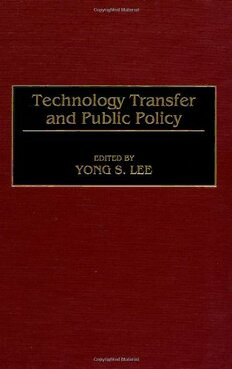Download Technology Transfer and Public Policy PDF Free - Full Version
Download Technology Transfer and Public Policy by Yong Lee in PDF format completely FREE. No registration required, no payment needed. Get instant access to this valuable resource on PDFdrive.to!
About Technology Transfer and Public Policy
Why has the United States established a new technology transfer regime, and how does it actually perform? Lee and his contributors see it as a set of new game rules in which government, industry, and the academic community are allowed—authorized, in fact—to interact and collaborate toward the goal of successful technological innovation. Their book—thus far unique in its field—reports on the empirical research that examines how various independent components of the system interact and collaborate. In doing so the authors provide data and information on which policy assumptions are valid and which aren't, which rules are helpful and which are hindrances, and how the various players in this game assess its future. The result is an important contribution to the literature that explores the interface of business, government, and society—essential reading not only for academics, but also for corporate management concerned with business strategy and policy.Lee and the contributors point out that as technologies grow in complexity, companies often target their internal resources on core competencies and utilize outside sources for supporting knowledge or technology. As universities step into the marketplace, trying to make money through aggressive commercialization of their intellectual property, they face conflict of interest problems within their walls, as well as complex and often unfathomable intellectual property negotiations with the corporations with whom they deal. Their third major point is that with declining R&D budgets but increasingly tough competition, American faculty members are troubled by the collision of two powerful but not necessarily complementary motives: the need for external funding for research and the need to preserve academic freedom and intellectual autonomy. How these issues and problems are dealt with is carefully and readably explored in this volume, which will contribute significantly to the ongoing debate.
Detailed Information
| Author: | Yong Lee |
|---|---|
| Publication Year: | 1997 |
| ISBN: | 9781567200843 |
| Pages: | 324 |
| Language: | English |
| File Size: | 3.976 |
| Format: | |
| Price: | FREE |
Safe & Secure Download - No registration required
Why Choose PDFdrive for Your Free Technology Transfer and Public Policy Download?
- 100% Free: No hidden fees or subscriptions required for one book every day.
- No Registration: Immediate access is available without creating accounts for one book every day.
- Safe and Secure: Clean downloads without malware or viruses
- Multiple Formats: PDF, MOBI, Mpub,... optimized for all devices
- Educational Resource: Supporting knowledge sharing and learning
Frequently Asked Questions
Is it really free to download Technology Transfer and Public Policy PDF?
Yes, on https://PDFdrive.to you can download Technology Transfer and Public Policy by Yong Lee completely free. We don't require any payment, subscription, or registration to access this PDF file. For 3 books every day.
How can I read Technology Transfer and Public Policy on my mobile device?
After downloading Technology Transfer and Public Policy PDF, you can open it with any PDF reader app on your phone or tablet. We recommend using Adobe Acrobat Reader, Apple Books, or Google Play Books for the best reading experience.
Is this the full version of Technology Transfer and Public Policy?
Yes, this is the complete PDF version of Technology Transfer and Public Policy by Yong Lee. You will be able to read the entire content as in the printed version without missing any pages.
Is it legal to download Technology Transfer and Public Policy PDF for free?
https://PDFdrive.to provides links to free educational resources available online. We do not store any files on our servers. Please be aware of copyright laws in your country before downloading.
The materials shared are intended for research, educational, and personal use in accordance with fair use principles.

